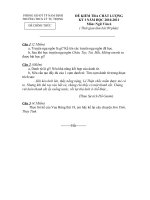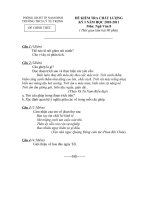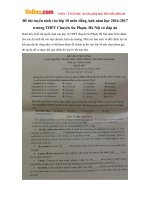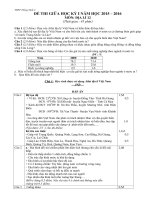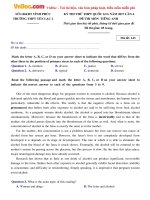Tải Đề thi giữa học kì 1 môn tiếng Anh lớp 11 trường THPT Xuân Giang năm học 2017-2018 có đáp án - Đề kiểm tra giữa học kỳ I môn tiếng Anh lớp 11
Bạn đang xem bản rút gọn của tài liệu. Xem và tải ngay bản đầy đủ của tài liệu tại đây (103.88 KB, 2 trang )
<span class='text_page_counter'>(1)</span><div class='page_container' data-page=1>
<b>Xuan Giang High school THE FIRST MID TERM TEST – No2 – Grade11 </b>
<b> Code: 501 </b>
<b>Choose the underlined part that differs from the other three in pronunciation in each question.</b>
1. A. talent B. value C. access D. donate
2. A. discrimination B. disabilities C. scholarship D. describe
<b>Choose the word whose stress is different from the others.</b>
3. A. impairment B. dictionary C. voluntary D. television
4. A. cognitive B. alphabet C. protective D. difficulty
5. A. integration B. discrimination C. international D. interpersonal
<b>Choose the correct answer to each of the following questions</b>
6. For American culture, a parent's most important task is to teach their children ______.
A. to have own bedroom B. to live independently C. to eat alone D. to join charity
7. More contacts between non-disabled and disabled people will change reduce ______ in life.
A. discrimination B. discriminating C. discriminatory D. to discriminate
8. ______ medical care and economic hardships, children with cognitive impairments face a lot of discrimination in
life.
A. In my opinion B. Up to now C. In addition to D. As you know
9. Tom: There are so many skills that we need to become independent. - Jennifer: ______.
A. but I think you are right B. Well, you know it
C. Who have these skills D. Oh, really? I never thought about that
10. This is the first time she ______ such a handsome boy.
A. has been seeing B. is seeing C. saw D. has seen
11. John and I ______ at the same school, and we ______ great friends ever since.
A. studied / were B. studied / have been C. have studied / were D. have studied / have been
12. Nam has supported the campaign ______.
A. for 2 months ago B. since 2 months C. for 2 months D. since last month ago
13. Children with visual impairments at regular schools still find it ______ in all school activities.
A. hard to take part B. to take hard part C. to hard take part D. to take part hard
14. There are ______ specialized materials and tools used for disabled people such as Braille, large print books, and
talking computers.
A. a variety on B. a variety of C. the variety of D. the variety on
15.Last year I volunteered to teach at a school for people with hearing impairments and
______ a campaign to
help them.
A. to launch B. launching C. have launched
D.
launched16.
Teens should have the ability to __________ loneliness.
A. deal B. cope with
C. set up
D. look after
17.
The people who can't hear are the ____.
A. dumb
B. deaf C. blind D. mentally retarded
18. A________ is a series of actions intended to achieve a goal.
A. campaign B. impairment C. donation
D. condition
19. I used to ___________ children who wanted to do a sport.
A. volunteer B. change
C. coach
D. improve
20.Lien last visited a centre for children with cognitive impairments two weeks ago.
A. Lien hasn't visited a centre for children with cognitive impairments for two weeks.
B. It's two weeks when Lien visited a centre for children with cognitive impairments.
C. Lien visited a centre for children with cognitive impairments for two weeks.
D. This is the last time Lien visited a centre for children with cognitive impairments.
21.I’ll win the race. I'm determined.
A.I'm determined winning the race B.I’m determined to win the race
C.To win the race is determined D. The race is determined to win
22.Don’t try to make him change his mind. It's not easy.
A.It's easy to make him change his mind. B.To make him change his mind is easy .
C. It's not easy to make him change his mind. D.Making him change his mind is not difficult
23.Mary “Can I try your new camera?” - Tom : “____________.”
A. I’m sorry I can’t. Let’s go now. B. Sure. I’d love to.
C. Sure. But please be careful with it. D. I’m sorry. I’m home late.
</div>
<span class='text_page_counter'>(2)</span><div class='page_container' data-page=2>
A. giver B.taker C.maker D. sender
26.It was in __________ that the first Olympic Games were held .
A. America B.Greece C. Britain D.France
<b>Choose the underlined part that needs correction in each of the following questions</b>
27.Are Vietnamese children allowed to join their parents in making family choose?
A B C D
28.Einstein, the father on modern physics, could not read until he was eight.
A B C D
29.Many non-disabled people still has negative attitudes towards children with cognitive impairments.
A B C D
<b>Choose the correct option A, B, C or D to complete this passage</b>
Being able to take care of yourself and not having to (30) ______ on anyone else. That is what many young people (31)
_______ for. However, the ability to live independently does not develop naturally: you need a number of life skills to
stop relying on your parents and older siblings. Among those skills, time (32) _______ is probably the most important
one. With good time management skills, you can build your confidence and (33) _______. These skills will also help
you perform your daily tasks, including your responsibilities at school and at home. If you can use your time wisely,
you will not feel very stressed when exam dates are approaching. You can act more independently and (34) _______,
get better grades at school and have more time for your family and friends.
<b>30.</b> A. refer B. keep C. trust D. rely
<b>31.</b> A. strive B. look C. care D. call
<b>32.</b> A. development B. installment C. entertainment D. management
<b>33.</b> A. self-fulfillment B. self-esteem C. influence D. creative
<b>34.</b> A. daughter B. naturally C. responsibly D. couple
<i><b>Read the following passage and choose the correct answer to each of the questions.</b></i>
Welcome to Get Involved! our weekly programme about inspirational young people. Today, I’ll tell you the
amazing story of an outstanding young person with a disability. Nguyen Anh was born with “glass-born disease”, a
genetic disorder causing <b>fragile</b> bones, and had fractured bones over 30 times. She is unable to run around like her
friends, and has to use a wheelchair. Despite her disability, she always has a smile on her face. She believes that she is
luckier than other people with disabilities because she has many supportive friends and teachers.
Nguyen Anh has been interested in singing since an early age. Eager to join Charitable campaigns, she has been
using her talent to perform at Voice of Viet Nam since she was eight. She has taken part in broadcasting radio messages
to rural villagers. She has been honoured by UNICEF as an outstanding child with disabilities. Now, as a Friend of
UNICEF Viet Nam, she continues to inspire others, and use her talent and determination to help children with
disabilities.
She became a success when she auditioned for the television show <i>VietNam’s Got Talent. She immediately received</i>
national and international recognition.
Her smile and kind voice will definitely continue to encourage people with disabilities to fulfill their potential. Her
inspiring words are what we would like you to think about. "You can do a lot of things if people believe in you and
<i>actually treat you equally.” </i>
<b>35.</b> The girl has worked with Voice of Viet Nam in ______ to people in countryside.
A. sending out radio messages B. helping child with disabilities
C. inspiring words D. using her talent to perform her voice
<b>36.</b> The program is called _______.
A. VietNam’s Got Talent B. Voice of Viet Nam C. Charitable campaigns D. Get Involved
<b>37.</b> The word <b>“fragile”</b> in the first paragraph refers to ________.
A. daily glass B. easily broken C. extremely soft D. quickly break
<b>38.</b> Due to ________, UNICEF has honoured Nguyen Anh as an outstanding child with disabilities.
A. her “glass-born disease” B. Her smile and kind voice
C. her taking part in charitable campaigns D. her disability
<b>39.</b> The lesson we can learn from the story is that everyone can succeed if they are ______.
A. honoured by UNICEF B. taking part in charity
C. trusted and treated equally D. encouraged after teachers and friends
<b>40.</b> It can be inferred from the passage that ______.
</div>
<!--links-->
